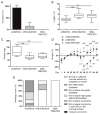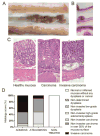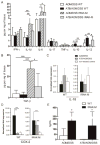Altered gut microbiota promotes colitis-associated cancer in IL-1 receptor-associated kinase M-deficient mice
- PMID: 23567778
- PMCID: PMC3744230
- DOI: 10.1097/MIB.0b013e318281330a
Altered gut microbiota promotes colitis-associated cancer in IL-1 receptor-associated kinase M-deficient mice
Abstract
Background: Microbial sensing by Toll-like receptors (TLR) and its negative regulation have an important role in the pathogenesis of inflammation-related cancer. In this study, we investigated the role of negative regulation of Toll-like receptors signaling and gut microbiota in the development of colitis-associated cancer in mouse model.
Methods: Colitis-associated cancer was induced by azoxymethane and dextran sodium sulfate in wild-type and in interleukin-1 receptor-associated kinase M (IRAK-M)-deficient mice with or without antibiotic (ATB) treatment. Local cytokine production was analyzed by multiplex cytokine assay or enzyme-linked immunosorbent assay, and regulatory T cells were analyzed by flow cytometry. Changes in microbiota composition during tumorigenesis were analyzed by pyrosequencing, and β-glucuronidase activity was measured in intestinal content by fluorescence assay.
Results: ATB treatment of wild-type mice reduced the incidence and severity of tumors. Compared with nontreated mice, ATB-treated mice had significantly lower numbers of regulatory T cells in colon, altered gut microbiota composition, and decreased β-glucuronidase activity. However, the β-glucuronidase activity was not as low as in germ-free mice. IRAK-M-deficient mice not only developed invasive tumors, but ATB-induced decrease in β-glucuronidase activity did not rescue them from severe carcinogenesis phenotype. Furthermore, IRAK-M-deficient mice had significantly increased levels of proinflammatory cytokines in the tumor tissue.
Conclusions: We conclude that gut microbiota promotes tumorigenesis by increasing the exposure of gut epithelium to carcinogens and that IRAK-M-negative regulation is essential for colon cancer resistance even in conditions of altered microbiota. Therefore, gut microbiota and its metabolic activity could be potential targets for colitis-associated cancer therapy.
Figures






Similar articles
-
RNase-L deficiency exacerbates experimental colitis and colitis-associated cancer.Inflamm Bowel Dis. 2013 May;19(6):1295-305. doi: 10.1097/MIB.0b013e318281f2fd. Inflamm Bowel Dis. 2013. PMID: 23567782 Free PMC article.
-
Effect of genetic deletion or pharmacological antagonism of tumor necrosis factor alpha on colitis-associated carcinogenesis in mice.Inflamm Bowel Dis. 2015 Mar;21(3):485-95. doi: 10.1097/MIB.0000000000000303. Inflamm Bowel Dis. 2015. PMID: 25581824
-
IL-1 receptor-associated kinase M downregulates DSS-induced colitis.Inflamm Bowel Dis. 2010 Oct;16(10):1778-86. doi: 10.1002/ibd.21287. Inflamm Bowel Dis. 2010. PMID: 20848470
-
Contribution of TLR signaling to the pathogenesis of colitis-associated cancer in inflammatory bowel disease.World J Gastroenterol. 2014 Sep 28;20(36):12713-21. doi: 10.3748/wjg.v20.i36.12713. World J Gastroenterol. 2014. PMID: 25278673 Free PMC article. Review.
-
Immunomodulation by gut microbiota: role of Toll-like receptor expressed by T cells.J Immunol Res. 2014;2014:586939. doi: 10.1155/2014/586939. Epub 2014 Jul 24. J Immunol Res. 2014. PMID: 25147831 Free PMC article. Review.
Cited by
-
Modulation of Anti-Tumour Immune Responses by Probiotic Bacteria.Vaccines (Basel). 2020 Jun 21;8(2):329. doi: 10.3390/vaccines8020329. Vaccines (Basel). 2020. PMID: 32575876 Free PMC article. Review.
-
Role of gut microbiota-immunity axis in patients undergoing surgery for colorectal cancer: Focus on short and long-term outcomes.World J Gastroenterol. 2020 May 28;26(20):2498-2513. doi: 10.3748/wjg.v26.i20.2498. World J Gastroenterol. 2020. PMID: 32523307 Free PMC article. Review.
-
Isoliquiritigenin decreases the incidence of colitis-associated colorectal cancer by modulating the intestinal microbiota.Oncotarget. 2016 Dec 20;7(51):85318-85331. doi: 10.18632/oncotarget.13347. Oncotarget. 2016. PMID: 27863401 Free PMC article.
-
Long noncoding RNA expression profiles in gut tissues constitute molecular signatures that reflect the types of microbes.Sci Rep. 2015 Jun 30;5:11763. doi: 10.1038/srep11763. Sci Rep. 2015. PMID: 26123364 Free PMC article.
-
Dietary Emulsifier-Induced Low-Grade Inflammation Promotes Colon Carcinogenesis.Cancer Res. 2017 Jan 1;77(1):27-40. doi: 10.1158/0008-5472.CAN-16-1359. Epub 2016 Nov 7. Cancer Res. 2017. PMID: 27821485 Free PMC article.
References
-
- Itzkowitz SH, Yio X. Inflammation and cancer IV. Colorectal cancer in inflammatory bowel disease: the role of inflammation. Am J Physiol Gastrointest Liver Physiol. 2004;287:G7–17. - PubMed
-
- Sartor RB. Microbial influences in inflammatory bowel diseases. Gastroenterology. 2008;134:577–594. - PubMed
-
- Tlaskalova-Hogenova H, Stepankova R, Kozakova H, et al. The role of gut microbiota (commensal bacteria) and the mucosal barrier in the pathogenesis of inflammatory and autoimmune diseases and cancer: contribution of germ-free and gnotobiotic animal models of human diseases. Cell Mol Immunol. 2011;8:110–120. - PMC - PubMed
Publication types
MeSH terms
Substances
Grants and funding
LinkOut - more resources
Full Text Sources
Other Literature Sources
Molecular Biology Databases
